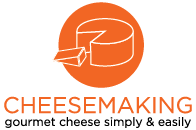Intensive Cheesemaking Course 1
This course is for people that have not made cheese previously or are who are fairly new to cheesemaking.
We start with basic cheesemaking principles, but we quickly move to more advanced cheesemaking techniques. If you are just starting cheesemaking or have previous cheesemaking experience you will benefit from the theory and techniques that are provided at this course.
The techniques that you will use can easily be applied to other cheeses, not just the ones we make at the course. These techniques are also easily adapted to goat and other animals’ milk.
The cheeses that you will make and take home with you are:
- Farmhouse Cheddar: This cheese demonstrates the techniques for making pressed, and hard cheeses. These same or similar techniques are used for making many other aged and harder and pressed styles of cheese, examples such as Edam, Gouda, Tomme, Cheshire, Caerphilly, Emmenthal, Gruyere and Cantal. Your cheddar will need to be aged for 3 – 9 months after the course.
- Creamy Brie: Brie has a lovely velvet coat of white mould. The techniques used to make Brie allows you to make any of the cheeses from the white moulded family such as Camembert, Triple Cream, Coulommiers, Neufchatel, Chaource, Truffle Brie and Ashed Brie. These styles are discussed at the course or are in your course notes booklet.
- Quark: This is a very similar cheese to cream cheese but there are also many alternatives that you can easily make at home such as goat curd, Labneh and Chev.
- Marinated Persian Feta: You will take this cheese home with instructions on how to marinate it with your favourite blend of oil and herbs.
- Soft Fresh Cheese: this is a French fresh lactic acid set style of soft cheese. It is traditionally formed into a log, crottin or pyramid. This cheese will be ready to eat when you get home. Just pick up some fresh bread and a nice wine on the way home. At home, you might try the many variations for this cheese, such as adding herbs and making a French-style lactic cheese with that typical ashed or Geotrichum wrinkled rind appearance.
- Cultured Buttermilk Ricotta: This is the simplest cheese that you will make, it uses cultured buttermilk instead of harsh acids, so it is very soft and milky when made correctly. Similar varieties that also use these same techniques include Paneer, Smoked Ricotta, Ricotta Salata and Baked Ricotta.
- Whey Ricotta: This is the gourmet of all ricottas. It is soft, delicate and creamy and a great way to use your whey, a product of cheesemaking that is often discarded. It is also difficult to find this extra soft ricotta in most stores. Due to time constraints, this cheese will be a demonstration only.
- Greek Feta: Feta can be a strong flavoured, dry and sometimes salty crumbly cheese that is a great addition to fresh salads, or you can very simply adjust the recipe to make it a soft creamy cheese that can be eaten a few days after you make it. Due to time constraints, this cheese will be a demonstration only.
All of the above cheese can be made using cow or goat milk however only cow’s milk will be used at the course.
